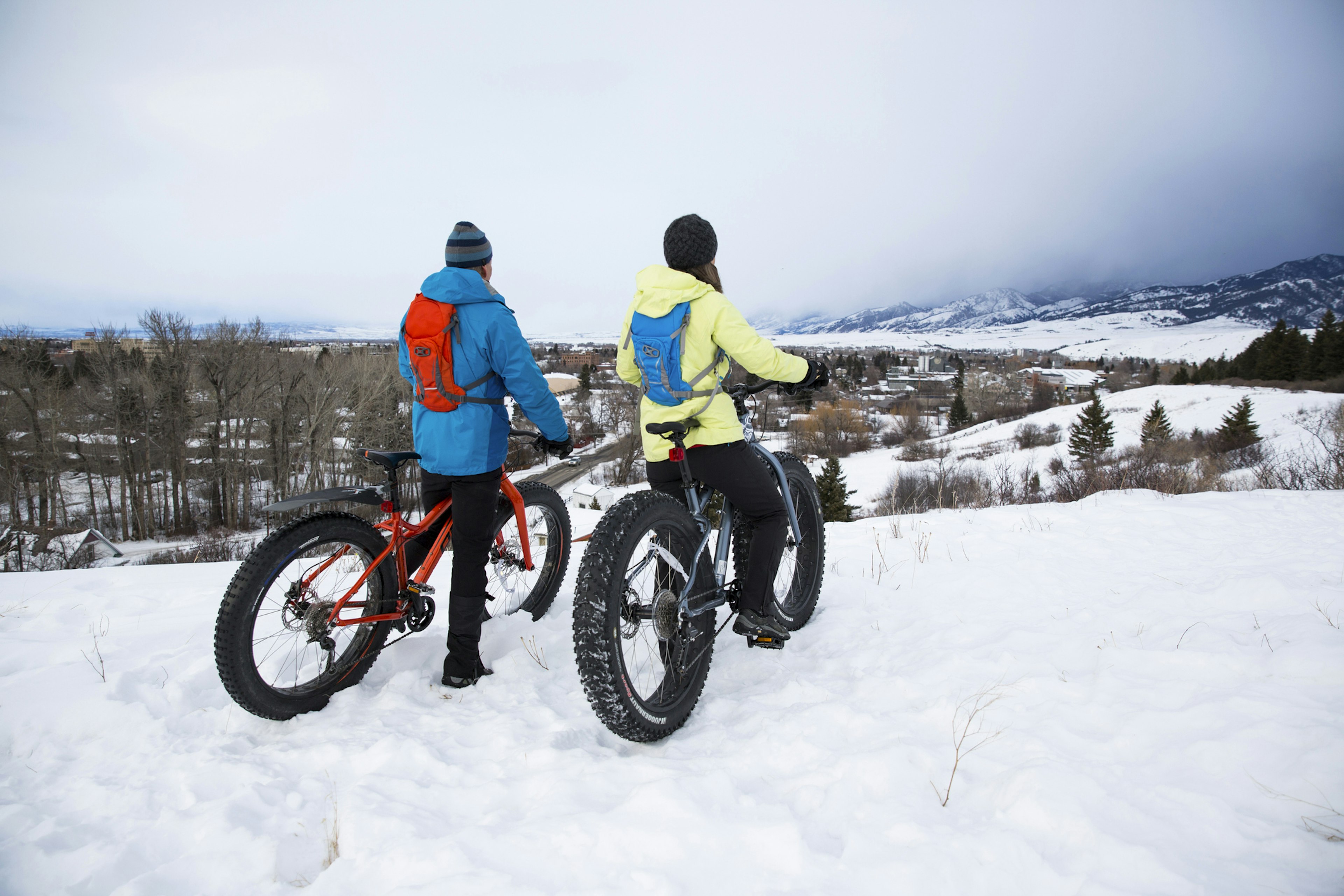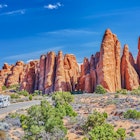
Nov 15, 2022 • 6 min read

Oct 9, 2024 • 7 min read

Go for cold: Montana has plenty of amazing winter activities beyond skiing. Visit Montana
Winter is a harsh but magical time to visit Montana. A winter hush descends upon a landscape so cold that even sound itself seems frozen. But for well-equipped adventurers with a certain level of outdoor experience, there are some incredible ways to enjoy Montana's stunningly beautiful mountain terrain in winter.
Of course, there are great things to do in Montana year-round, but winter has a special allure for fans of the white stuff. Whitefish and the surrounding Flathead Valley are unbeatable locations for pretty much every kind of winter sport, as is the Gallatin Valley between Big Sky and West Yellowstone.
For pristine backcountry skiing and snowmobiling, plus access to Yellowstone National Park, remote Cooke City is a great in-the-know destination. Here are the best things to do in Montana in winter.

For many people, winter is the very best season to visit Yellowstone National Park. There are almost no crowds, the geysers are at their steamiest, and the frozen landscapes are simply stunning. It's also a great time to meet the wildlife.
There are two essential parts of Yellowstone National Park to visit in winter. From West Yellowstone, snow-coach tours shuttle to Old Faithful, from where you can explore the park's geyser basins on skis or in snowshoes, before retreating for a hot chocolate and cozy overnight stop at the Old Faithful Snow Lodge.
Further north, the road linking Cooke City to the park entrance at Gardiner remains open to cars during winter. This opens up a host of snowshoe and cross-country skiing trailheads around the Mammoth region, some of which are served by snow-coach drops.
Planning Tip: Wildlife spotting in Yellowstone in winter is legendary – it's considerably easier to spot animals against a plain white background. For an unforgettable opportunity to lock eyes with a Yellowstone wolf, sign up for a wildlife-spotting trip with a local company such as Yellowstone Wolf Tracker.

While there's an environmental impact to exploring by snowmobile (some locals despair at the noise and fumes created by snowmobiles in Yellowstone National Park), if you are a confident rider, there's no more exciting way to traverse Montana's epic landscapes.
Cooke City is one of the most remote towns in Montana – with only one access road in winter, passing through Yellowstone National Park – but once you get here, the snowmobiling is incredible. Rentals and guides are available in town, and groomed Forest Service tracks climb to passes that offer astonishing views of the powder-filled Beartooth Mountains.
As the gateway for winter trips into Yellowstone, West Yellowstone is also well-suited for snowmobilers, with hundreds of miles of spectacular trails in the nearby Caribou-Targhee National Forest.
Other must-ride locations include the 250 miles of trails at Lolo Pass in the Bitterroot Mountains southwest of Missoula, or the Flathead National Forest near Glacier National Park, where you can rent snowmobiles or join a tour with Swan Mountain Snowmobiling.
Planning Tip: The minimum age for snowmobile rentals is usually 25, and hire companies require a valid driver's license. If you're new to the sport, consider taking an online course with an operator such as Snowmobile-Ed.

Combine Montana's cowboy heritage with its Norwegian immigrant history, and you get the sport of skijoring, where skiers are towed by horses, navigating a series of jumps and through slaloms at speeds of up to 40mph. It's the kind of sport that feels like it was invented during a night of heavy drinking – expect high adrenaline and some slightly silly fun.
For spectators, the best action can be found at Whitefish's World Skijoring Invitational in January or at West Yellowstone's National Championship in February. Alternatively, try Big Sky's Best of the West competition in the same month or the skijoring finals held during Red Lodge's Winter Fest in early March.

Montana has some mind-blowing backcountry skiing, but it's the kind of terrain best reserved for experienced skiers, and access doesn't come cheap. That said, you won't forget skiing powder-filled slopes all day, then retreating to a private wilderness yurt or cabin miles from civilization.
Several companies offer backcountry ski packages that include accommodation and guides. You can base yourself in cozy yurts with Yurtski in the Swan Mountains, with Bell Lake Yurt in the Bitterroot Mountains or with Beartooth Powder Guides in Cooke City. All offer avalanche and backcountry skiing courses, which are a wise investment if you're new to off-the-beaten-track skiing.
Hellroaring Powder Guides runs both unguided and guided backcountry skiing trips from their hut in the Centennial Mountains, 25 miles from West Yellowstone. Great Northern Powder Guides in the Whitefish region offers the only Cat skiing in the state, using their private cabin as a base for incredible, pristine descents.
Planning Tip: The cheapest way to sample some gentle cross-country backcountry skiing is to hire a Forest Service Cabin. For as little as $50, you can get a basic cabin for the night, though you'll need to chop wood for heating and cooking and pack in all your food.

It's hard to think of a more romantic way to traverse Montana's snow-draped winter forests and valleys than in a dog-pulled sled. Apart from the thrill of the scenery and learning the basics of how to mush, getting to interact with these energetic sleigh dogs is a highlight in itself.
Several outfitters offer hands-on dog sledding trips. In western Montana, try Base Camp Bigfork in the Flathead Valley, Winter Woods Dog Sled Tours outside Whitefish or nearby Dog Sled Adventures. Closer to Bozeman, check out Yellowstone Dog Sled Adventures in the southern Gallatin Valley or Spirit of the North Dog Sled Adventures in Big Sky.

A fat bike is essentially a mountain bike equipped with chunky double-width tires for riding on packed snow, and it's a great way to explore the Montana countryside in winter. This increasingly popular sport extends the biking season, opens up whole swatches of winter terrain to non-skiers, and allows you to push your riding to new limits. Don't worry too much about wiping out – the snow will cushion your fall!
The 22-mile Whitefish Trail is one of the best routes for snow biking in the state. The trailside Whitefish Bike Retreat, 9 miles west of Whitefish, offers fat bike rentals and access to groomed trails and their cozy accommodations, plus lots of trail advice and occasional three-day fat biking clinics.
Planning Tip: When you first start fat biking, pick a bike with flat platform pedals – you'll have slips and dismounts, and it's easier to get back on the bike if you don't have to worry about toe clips or cleats.

Montana has an almost unlimited choice of Nordic skiing trails if you don't require downhill thrills. West Yellowstone, Bozeman, Big Sky, Missoula, Red Lodge and Great Falls all offer Nordic ski centers with plenty of groomed trails. In Whitefish, try the Glacier Nordic Center or Big Mountain Nordic Trails, the latter best suited to more experienced skiers.
For something special, visit Glacier National Park in winter. Most park roads and accommodations close for the cold season, but you can ski or snowshoe from Lake McDonald Lodge near Apgar on the western side of the park, or along the Going-to-the-Sun Road from St Mary on the eastern side. Remote wilderness trails lead into the park from Polebridge ranger station and Marias Pass.
Planning Tip: Explore the frozen wonderland of Glacier National Park like a pioneer on a snowshoe tour arranged through the park's ranger-led program or with the Glacier Institute.

The bravest fly fishers don waders to enter Montana's chilly waters year-round, but there is a warmer alternative. By late December or early January (depending on when temperatures drop), large bodies of water across the state freeze over, and ice fishers set up camp and fish for lake trout, pike, walleye and more. Head to Eastern Montana for the best opportunities – popular spots include Nelson Reservoir, Fort Peck Lake, Tongue River Reservoir and Deadmans Basin.
If you're looking for pure relaxation, Montana's hot springs provide a nice change of pace (and temperatures) in winter. In fact, there's a route lined with hot springs spanning the state called Glaciers to Geysers, and many hot spring resorts are conveniently located near snowmobile trails and cross-country skiing trails.
It's a luxurious experience that doesn't always have a luxurious price tag. Recommended springs include Sleeping Buffalo Hot Springs in Missouri River Country; Chico Hot Springs, about 30 miles from Yellowstone National Park; Spa Hot Springs Motel in Central Montana; Norris Hot Springs in Southwest Montana (check out their live music calendar beforehand); and Quinn's Hot Springs in Paradise, Montana.
Planning tip: Time your soak for after sunset for some fabulous stargazing – the lack of light pollution here is amazing.


Nov 15, 2022 • 6 min read





Jul 20, 2024 • 6 min read


